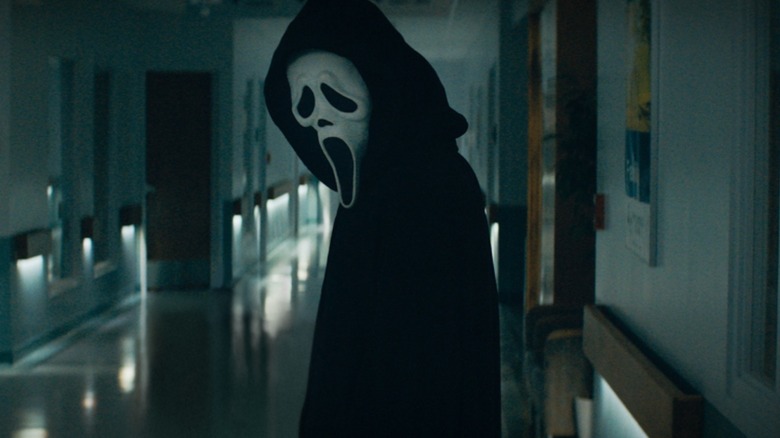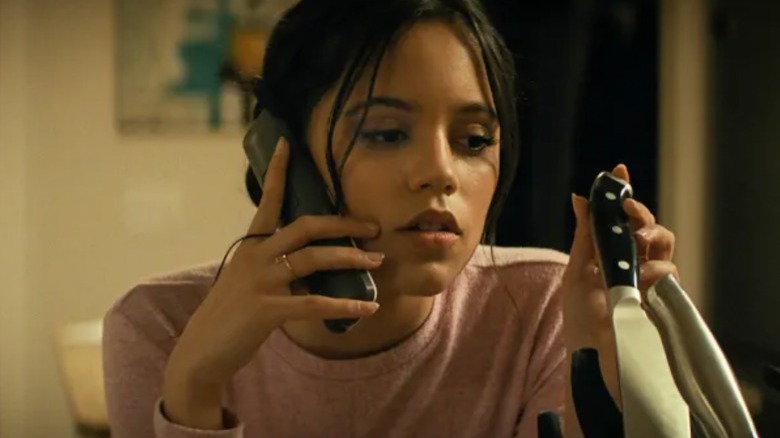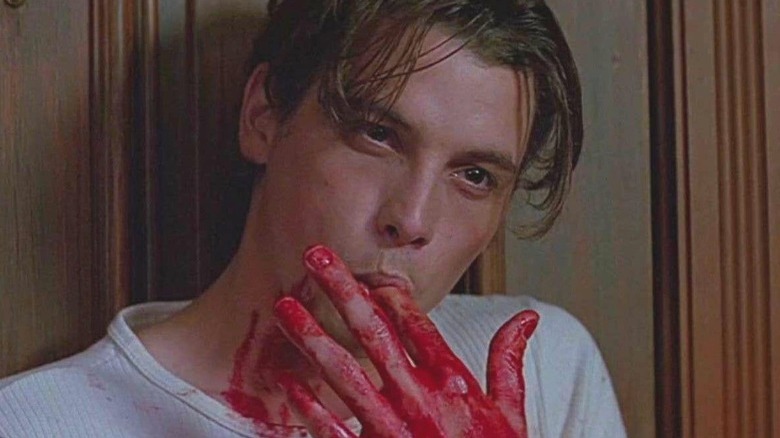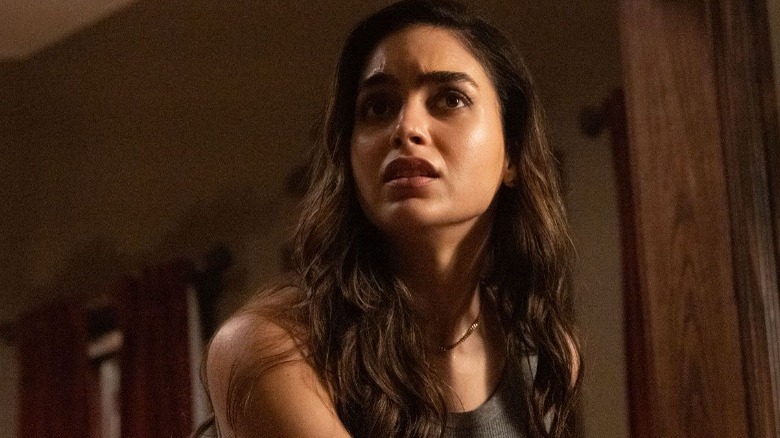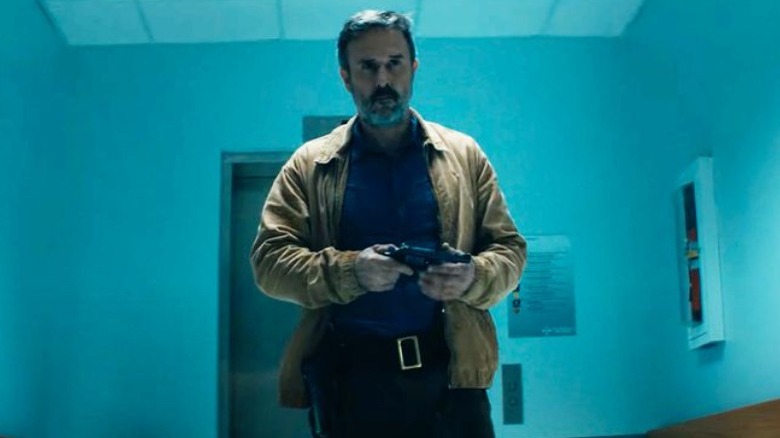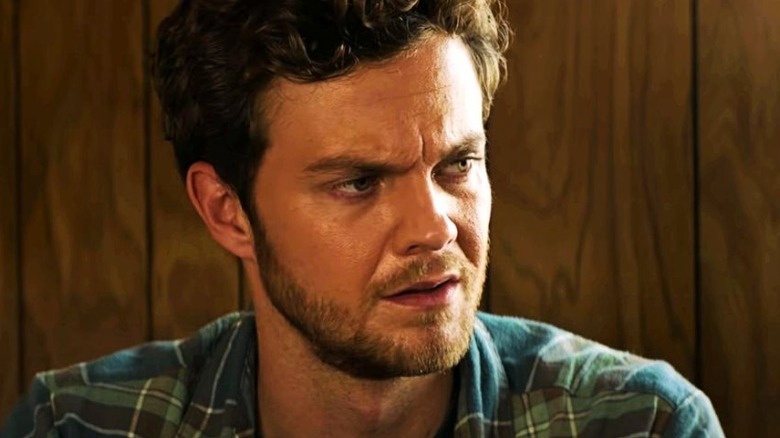Scream Spoiler Review: A Bloody Good Legacy Sequel Takes Aim At Toxic Fandom
With Jamie Lee Curtis returning to "Halloween," "Ghostbusters: Afterlife" dusting off the Ecto-1, and the "Jurassic Park" universe ever-expanding, it was only a matter of time before "Scream" got in on the legacy sequel game. The fifth film in the franchise is the first since original director Wes Craven's death, and as such, has a lot riding on it. With 11 years of new horror to mine for meta-commentary, "Scream" 2022 has plenty of ground to cover, and does so with enthusiasm.
The new sequel is more brutal and genuinely upsetting than several of its predecessors, presenting a Ghostface copycat with a clear sadistic streak. It's the best since the original at balancing a tricky tone, as it also often dips into ironic humor when it's not carving up its core cast. That new cast, by the way, is pretty stellar. While a few characters seem designed for disposability, others shine, like twins Chad (Mason Gooding) and Mindy (Jasmin Savoy Brown) and Ghostface's first victim, Tara (Jenna Ortega).
As the latest entry in a franchise that made a name for itself with big swings and third-act surprises, it's clear that "Scream" 2022's success depends on the movie's ability to pull off its reveals. The film has several, and doles them out throughout its two-hour runtime to varying success. For the most part, though, it nails the biggest twists, giving its killers a pitch-perfect motivation for the modern horror era and breaking some major franchise rules for the first time.
Major spoilers follow for "Scream."
Introducing: Final Girl Jenna Ortega
"Scream" movies love horror tropes, and over the years, they've created a few of their own. High on that list is the opening sequence kill, a tradition that started when Drew Barrymore's blonde-bobbed teen first picked up her home phone in 1996. Since then, this scene has taken place in a movie theater, the home of a Hollywood star, and in an ultra-meta movie-in-movie-in-movie sequence.
The latest "Scream" goes back to its suburban roots, opening the film with teenaged Tara begrudgingly picking up her home phone to talk to one of her mom's AA friends. As the call goes on, the man's voice begins to warp, slowly edging towards Ghostface territory and then back into the voice of an average joe. Tara, who quickly admits she grew up on "elevated" horror like "The Witch" and "The Babadook," doesn't catch on to what's happening until Ghostface gets explicitly threatening.
As far as "Scream" openers go, this one is an all-timer, largely because of Jenna Ortega's powerhouse performance. Ghostface kicks off his new era with some truly heinous behavior. After sending footage of Tara's best friend Amber (Mikey Madison), he breaks into Tara's house instead. Ghostface throws her to the ground by her braid, breaking her leg, and stabbing her several times–including, in a squirm inducing moment, straight through her raised hand.
Tara instantly establishes her final girl chops, responding to the Ghostface attack with resilience despite her obvious horror. As a horror fan, it's easy to forget how much goes into a truly great horror performance until you see someone being chased down in a way that feels immediate and terrifying like this. When we learn, soon after the scene ends, that Tara lived through this attack, it's an excellent surprise that marks the film's first subversion of its own rules.
Billy Looming
"Scream" takes its biggest narrative risk with its lead, Sam (Melissa Barrera). Viewers learn early on that Sam is seeing visions of Billy Loomis, once again played by Skeet Ulrich, reprising his role with digital de-aging and the same bloody white shirt we last saw him in. Eventually, Sam explains her connection to the killer to hospital-bound Tara. It turns out Sam is secretly Billy's daughter, and she accidentally broke up her family when she found out the truth years earlier.
Aspects of the Billy angle work well, but in some ways, it's the film's weakest element. The story surrounding Sam and Tara's estrangement is impactful enough on its own, even without Sam worrying that she might have the blood of a killer. The "Scream" saga has always revolved around family secrets, and the latest version presents an interesting one by showing, from multiple perspectives, how Billy can still wreak havoc decades after his death.
But the movie drives the point home in a way that doesn't always hit as intended. Sam frequently catches Billy's eyes in reflective surfaces, and it's never actually clear whether she's suffering from some mental illness or simply imagining his influence. What is clear, though, is that she's capable of great violence like her father. During the film's climax, she dispatches one of the Ghostface killers with brutal relish, stabbing him several times and slitting his throat. Void of any further examination, it's a pretty odd moment. Perhaps we're meant to see it as Sam getting out the last of her father's anger, but if so, that's a pretty one-dimensional representation of violence's legacy.
An Ending, Or Just A New Chapter?
This moment, like much of the latest sequel, lands differently depending on whether you approach the film as a final chapter or a first one. If we think Sam will be back later, it makes sense for the film to hint at her progressing instability. If we think this is the end... Well, then a lot of the film makes a lot less sense.
"Scream" is ostensibly a tribute to Wes Craven, but that doesn't mean it's the last we'll see of the franchise. When horror fanatic Mindy — Randy's (Jamie Kennedy) niece — explains the rules of legacy sequels, she asserts that it's difficult to reboot a horror franchise successfully these days without a bridge film that allows the original cast to essentially give their blessing to the new generation. If that's what this "Scream" turns out to be, then it's a smashing success. Before the credits roll, filmmakers Matt Bettinelli-Olpin and Tyler Gillett take time to show us that immediate fan favorite characters Mindy and Chad both made it through the night, as did Tara and Sam.
If "Scream" 2022 is a legacy sequel that sets up more "Scream" films, rather than a conclusion, it also makes Sam's messy path to liberation from Billy's legacy more forgivable. The film works well-enough as a self-contained horror movie, but just as "Scream" movies tend to reach into the past, they're also often great predictors of the future.
We're Playing By Legacy Sequel Rules, Now
Unfortunately, Mindy also points out early on that in a legacy sequel, no one is safe. "Scream" 2022 brings back all three of the previous films' main cast members, but frames Sidney (Neve Campbell), Gale (Courtney Cox), and Dewey (David Arquette) mostly as world-weary advisors rather than key characters. They're central to the story in that they eventually pick up guns and face Ghostface head-on, but it's clear this isn't, first and foremost, their story.
Another thrilling highlight of the film comes at the tail end, when a hospital showdown pushes the movie into its bloody endgame. The extended sequence casts Tara in the Laurie Strode role of "Halloween II," leaving her defenseless in a hospital when her killer comes back to finish the job. Again, Ortega delivers the most compelling performance of the film, and again, her showdown with Ghostface goes beyond the typical taunt-and-stab set-up of his kills. We see Tara's pain as she moves her broken body into a wheelchair, and the blood soaking through her ripped-open wounds as she slowly rolls down the abandoned hallway.
When Ghostface catches her, it's more like something out of "The Strangers" than a Wes Craven picture. He follows her slowly, playfully, like a cat sneaking up on a mouse. Past "Scream" films may have worried that giving their killers too much flair might reveal their identity prematurely, but "Scream" doesn't care about that. It cares about the ice-cold feeling it gives us when it reminds us that death is real, even if horror franchises seem to live on forever.
When Dewey dies facing Ghostface in the hospital, it's neither the film's best nor worst moment, but it's guaranteed to be one of its most talked-about. "Scream" movies are designed to attract the type of ardent fans who think they could write the movie better than its writers themselves, and Dewey's last moments — which are badass, heartbreaking, and frustrating all at once — walk the line between an epic sendoff and a stakes-raising trope the film could've lived without. But I always err on the side of enjoying movies that kill off our favorites, because they aren't afraid to do what needs to be done in order to move the story forward, even if it enrages fans.
#ReleaseTheRichieCut
Speaking of enraged fans, that's what "Scream" turns out to be about, in the end. When the killers are finally unmasked after a chaotic memorial-turned-rager, they turn out to be Tara's best friend, Amber, and Sam's boyfriend, Richie (Jack Quaid). "Scream" works overtime to make us think Richie couldn't possibly be the killer, as he's initially clueless about the "Stab" story and rigidly adheres to survivors' rules when he does find out about it. Hell, Dewey even names him as his prime suspect when they first meet.
This is another point at which your opinion on "Scream" 2022's success will depend heavily on your own expectations. By its own admission in this chapter, the series isn't designed to get deep, but I also don't think its unmasking is essential to whether or not the film works. And while Amber and Richie may not be the most surprising killer reveals, their motivations tie the whole movie together in a way that's simply delicious.
Amber and Richie hate "Stab 8," the most recent sequel to the movie based on Sidney's life. They really hate it, to the point that they hatched a plan to start killing people in a cooler and more original way to inspire a future installation that undoes all the pseudo-pain and suffering the last one inflicted on them. Richie goes on a tirade about the concept of "toxic fandom," and says he's doing this for the true fans.
Set aside every other thing it does well; this is where "Scream" 2022 truly proves itself worthy of our attention. What's more meta than calling out your own fans? Of course, "Scream" fans aren't as dangerously entitled as fans of other franchises, but this sharp commentary from screenwriters James Vanderbilt and Guy Busick can apply to any number of fandoms. There are real-life fans who spend every free moment they have harassing filmmakers, journalists, actors, and anyone else who they think is responsible for making a piece of media that "ruined" something they loved. If that type of obsession isn't pathological and frightening enough to transplant straight into a "Scream" movie, I don't know what is.
In the end, "Scream" succeeds best as exactly the thing it tells us it is — a legacy sequel that establishes its own originality while paying significant tribute to the place it came from. While not everything it tries lands perfectly, intense kills, charismatic characters, and sharper-than-usual meta-commentary make it a franchise high point.
